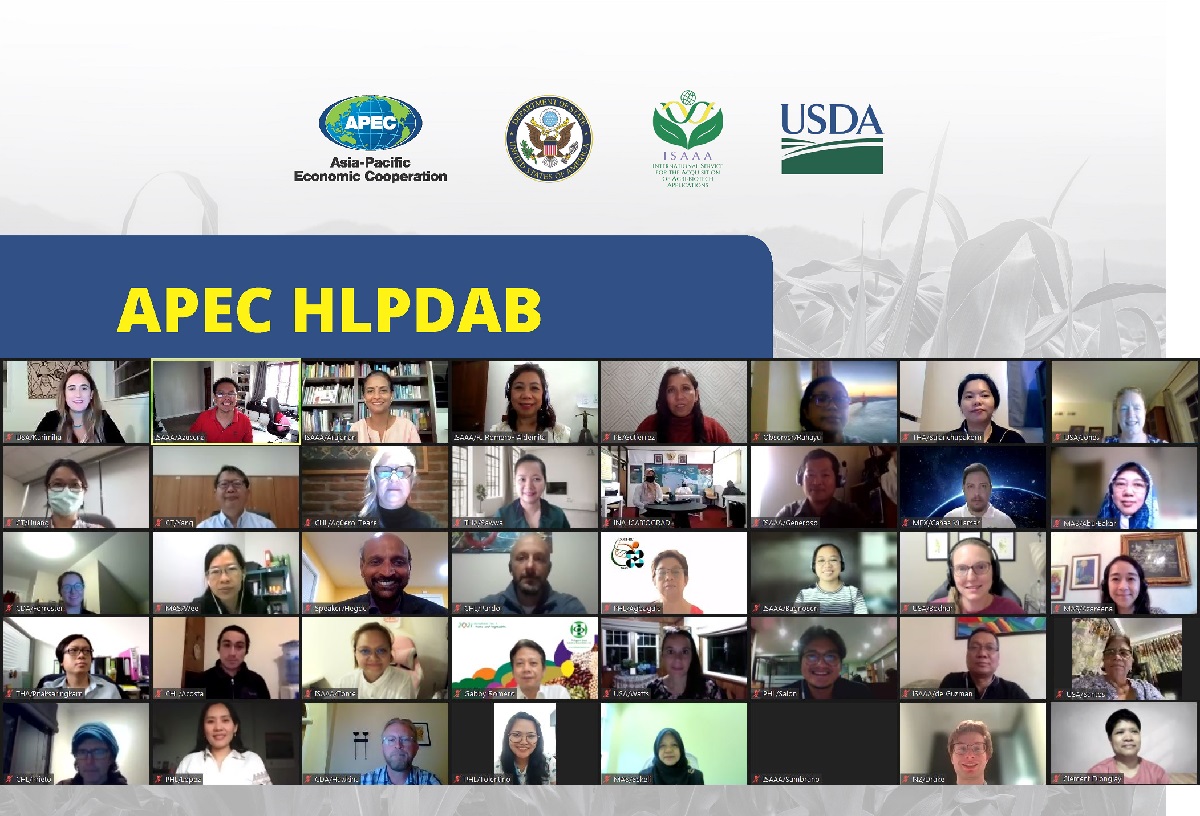
APEC Members Discuss Genome Editing Technology and Policy Strategies
July 1, 2021| |
The Asia-Pacific Economic Cooperation (APEC), ISAAA, United States Department of State, and U.S. Department of Agriculture (USDA) completed the second part of the APEC High-Level Policy Dialogue on Agricultural Biotechnology on June 29-30, 2021. The activity was attended by 14 economy members and focused on genome editing and the readiness of economy members for the technology and its products to enter the market.
The activity was divided into two days, with the first day focusing on genome editing technology and the policies that regulate it. Dr. Carl Ramage, Managing Director of Rautaki Solutions Pty. Ltd. and the Chair of the Institutional Biosafety Committee of La Trobe University in Melbourne Australia provided the background of the science and potential of genome editing. This was followed by a presentation on the policy considerations for genome editing products highlighting the elements of science-based policies and how these policies play a role in the development and commercialization of genome-edited products by Dr. Szobolcs Ruthner of the International Seed Federation in Switzerland. Thereafter, three representatives from Chile, the Philippines, and the United States discussed their respective economy's policy approaches and regulatory considerations for different genome editing products. They also talked about the approaches that their economies incorporated into the national regulatory frameworks to prepare themselves for the adoption and use of the technology.
The second day concentrated on the market-readiness of the economies for genome-edited products. Case studies were presented by Dr. Alexandre Nepomuceno of the National Soybean Research Center, Brazilian Agricultural Research Center of Brazil, and Prof. Martin Lema, former Chair of the Biosafety Committee of Argentina and Adjunct Professor in the University of Quilmes. Their presentations were intended for the audience to understand the policy approaches used by the two economies that helped facilitate the commercialization of genome-edited products, as well as highlight the agricultural biotechnology frameworks implemented in order to avoid policy incompatibilities among neighboring economies. These presentations were followed by case studies of Argentina and the Asian Region on the policy approaches used by their economies that helped facilitate economic opportunities and better investment in research and development innovation by Prof. Lema and Dr. Gabriel Romero of the Philippine Seed Industry Association, respectively. The second day concluded with individual economy reports on the state of genome editing policies, and the member representatives' impressions on and takeaways from the workshop.
ISAAA Global Coordinator Dr. Mahaletchumy Arujanan and ISAAA SEAsiaCenter Director Dr. Rhodora Romero-Aldemita along with Dr. Gabriel Romero served as moderators during the event.
For more details, contact knowledge.center@isaaa.org.
| |
You might also like:
- APEC Members Tackle Developments in Biotech Regulations
- Regulatory and Policy Officials of APEC Economies Briefed on Biotechnology and Plant Breeding Innovations
- APEC: Biotechnology Powerful Tool for Sustainable Agriculture
Biotech Updates is a weekly newsletter of ISAAA, a not-for-profit organization. It is distributed for free to over 22,000 subscribers worldwide to inform them about the key developments in biosciences, especially in biotechnology. Your support will help us in our mission to feed the world with knowledge. You can help by donating as little as $10.
-
See more articles:
-
News from Around the World
- Experts Explain How Gene Drives Control Invasive Species
- Philippine Media Use Less Fear Appeal as More Farmers Adopt Biotech Maize
- Can Gene Drive Eliminate Vector-borne Diseases?
- PennState Scientists Identify Sorghum Genes for Resistance to Anthracnose Leaf Blight
- EU Report Confirms Glyphosate Doesn't Cause Cancer
- Rutgers Study Sheds Light on Evolution of Photosynthesis
- Study Finds Barley Protein Could Help Boost Its Yield in High Temperatures
-
Plant
- UK's First CRISPR Field Trials Show Potential of Gene Editing
- Customizable Molecular Scissors for Tailoring Plant Genomes
- UC San Diego Scientists Develop First CRISPR-Cas9-based Gene Drive in Plants
- APEC Members Discuss Genome Editing Technology and Policy Strategies
- Simultaneous Editing of Susceptibility Genes in Rice Leads to Disease Resistance
-
Read the latest: - Biotech Updates (February 11, 2026)
- Gene Editing Supplement (January 28, 2026)
- Gene Drive Supplement (February 22, 2023)
-
Subscribe to BU: - Share
- Tweet

